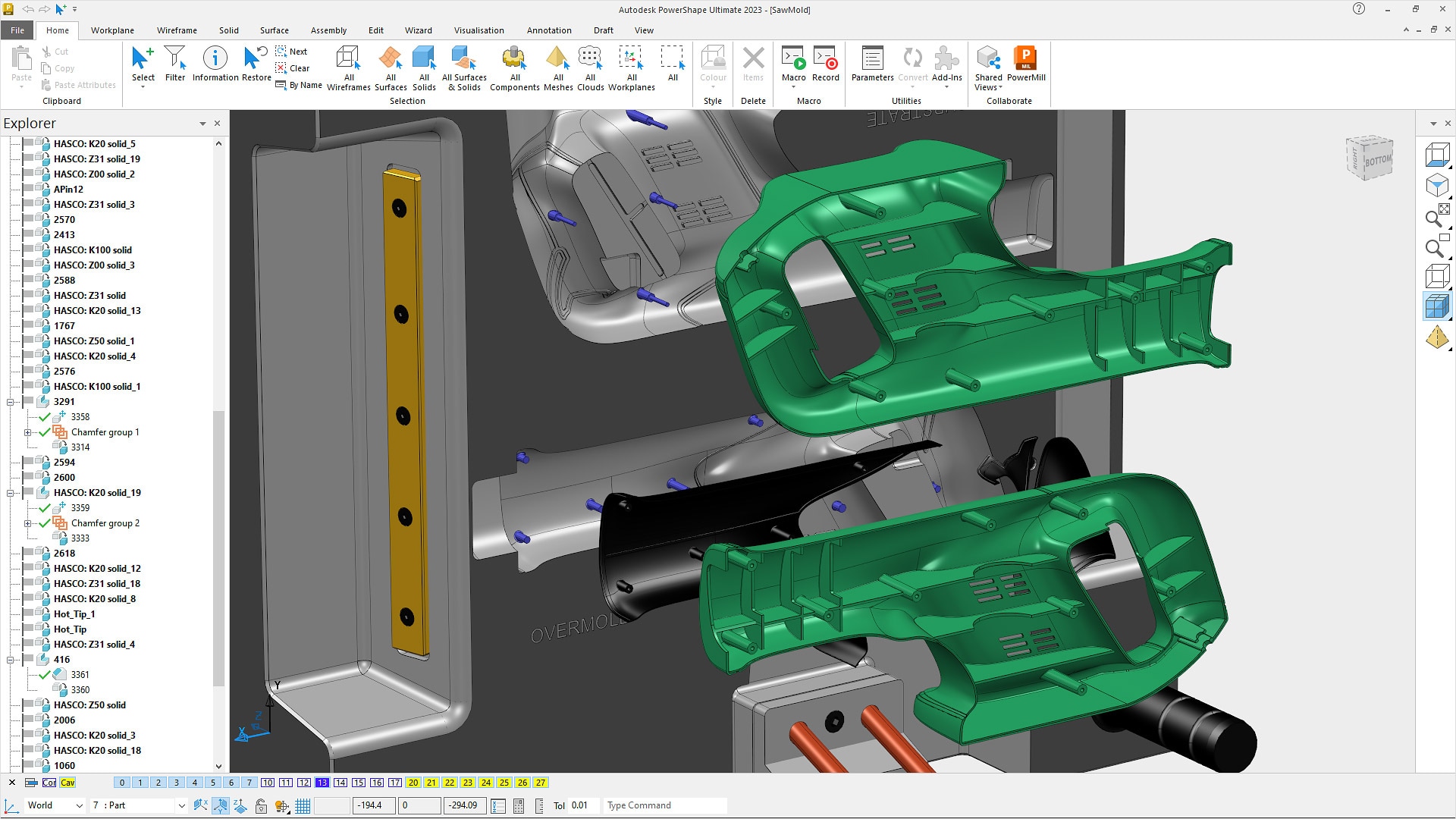& Construction

Integrated BIM tools, including Revit, AutoCAD, and Civil 3D
& Manufacturing

Professional CAD/CAM tools built on Inventor and AutoCAD
Autodesk Fusion with PowerShape® helps manufacturers import, fix, and prepare complex models for CNC machining. Use it as a modeling companion to get more from PowerMill.
Create CAM-specific geometry and use with PowerMill for enhanced control of your CNC machines
Analyze imported CAD models to identify and fix faults that could complicate downstream processes
Convert imported CAD designs into models ready for CAM programming, even if the model is faulty
Produce the most complex geometry using powerful surface creation and manipulation tools
Make major changes quickly to imported solid models without the need for a solid history
Split models into core and cavity halves, including parting surfaces, sliders, and shut-out faces
Automate electrode design for EDM. Add clearance, extensions, holder geometry, and spark gaps.
Avoid damaging cutting tools by preventing access to slots that will be produced with EDM
Simplify the creation of highly complex addendum and parting surfaces, used in the design of press tools
Use built-in catalogs to complete the mold-base design. Add sliding cores, lifters, mold locks, and cooling circuits.
Use reverse engineering tools to convert STL meshes into wireframes, surfaces, and solid models
Access tools to manipulate large STL meshes. Fix gaps, smooth regions, and combine with surface and solid data.
Import, analyze, and repair
Analyze imported CAD models to identify and fix faults that could complicate downstream processes. (video: 2:07 min.)
Tolerant solid modeling
Convert imported CAD designs into models ready for CAM programming—even if the model is faulty. (video: 1:28 min.)
Flexible surface modeling
Produce complex geometry using powerful surface creation and manipulation tools. (video: 1:51 min.)
Direct modeling
Quickly make major changes to imported solid models without the need for a solid history. (video: 2:07 min.)
SUBSCRIPTION ONLY
Shared views
Share 3D views of model data with stakeholders. View anywhere, anytime on cloud-connected devices. (video: 2:17 min.)
Autodesk Drive
Subscription only:
Save model data to Autodesk Drive, a secure cloud site. Organize data and let team members review and collaborate.
Accessibility shading
Check the machinability of complex parts. Identify undercut features that require 3+2 or 5-axis machining.
Sketch with parameters
Use parameters and mathematical expressions to construct 2D sketches and solid models.
Extend primitives
Extend the edges of primitive surfaces or solids with a single command dynamically or by a user-defined distance.
Lightweight holes
Identify additional hole features found in complex models imported without a solid modeling history.
Cage morphing
Use a 3D control cage to distort the size and shape of surface, solid, and mesh models.
Assembly modeling
Define libraries of a component and form complex assemblies using drag-and-drop attachment points.
Nesting
Automatically nest groups of wireframe geometry into pre-defined outer boundaries.
Curve wrapping/unwrapping
Wrap curves onto 3D surface and solid models. Unwrap 3D curves to produce 2D outlines for trimming applications.
Every CAD support
Import neutral and third-party files from mainstream CAD systems into PowerShape.
Core and cavity splitting
Split models into core and cavity halves, including parting surfaces, sliders, and shut-out faces. (video: 2:01 min.)
Electrode wizard
Automate electrode design for EDM. Add clearance, extensions, holder geometry, and spark gaps. (video: 2:07 min.)
Rib capping
Avoid damaging cutting tools by preventing access to slots that will be produced with EDM. (video: 1:20 min.)
Complex electrode modeling
Combine Direct Modeling tools with the PowerShape electrode wizard to create complex electrodes with vector burning.
Multi-impression electrodes
Burn multiple EDM features with a single roughing and finishing electrode for improved productivity.
Automated electrode machining
Connect with PowerMill and apply user-defined machining templates to families of electrodes for automatic CAM programming.
Integrated electrode inspection
Connect with PowerInspect to validate the size and position of the electrode during CNC machining and subsequent EDM.
Connect your EDM hardware
Interface with shop-floor hardware to automate the EDM process and avoid human setup errors.
Replace solid face
Replace faces on solid models with a single command, and reduce the time needed to incorporate design changes.
Solid from text
Create multiple 3D solid extrusions using 2D text. Combine with TrueType fonts to simplify text additions to models.
Specialist press-die surfaces
Simplify the creation of highly complex addendum and parting surfaces, used in the design of press tools.
Mold-base design
Use built-in catalogs to complete the mold-base design. Add sliding cores, lifters, mold locks, and cooling circuits.
Import scan data
PowerShape integrates with scanning devices to capture measurement data and quickly convert into usable 3D models. (video: 2:07 min.)
Mesh Doctor
Find and fix common faults seen in imported STL meshes to avoid potential issues downstream. (video: 46 sec.)
Reverse engineering
Use reverse engineering tools to convert STL meshes into wireframes, surfaces, and solid models. (video: 2:16 min.)
Mesh alignment
Accurately and automatically align meshes with other triangle models, surfaces, or solids.
Mesh outline curve
Produce a 3D curve representing the outline of STL meshes and use to assist with surface and solid modeling.
Mesh modeling
Access tools to manipulate large STL meshes. Fix gaps, smooth regions, and combine with surface and solid data.
Interactive triangle modeling
Interactively sketch triangles to close complex holes found in STL meshes.
Morphing compensation
Use morphing to counter the effects of gravity and stress relief on parts, reducing quality-related concessions.
Adding textures
Add logos and badges to your 3D model. Wrap repeating patterns of textures onto entire models or localized regions.
